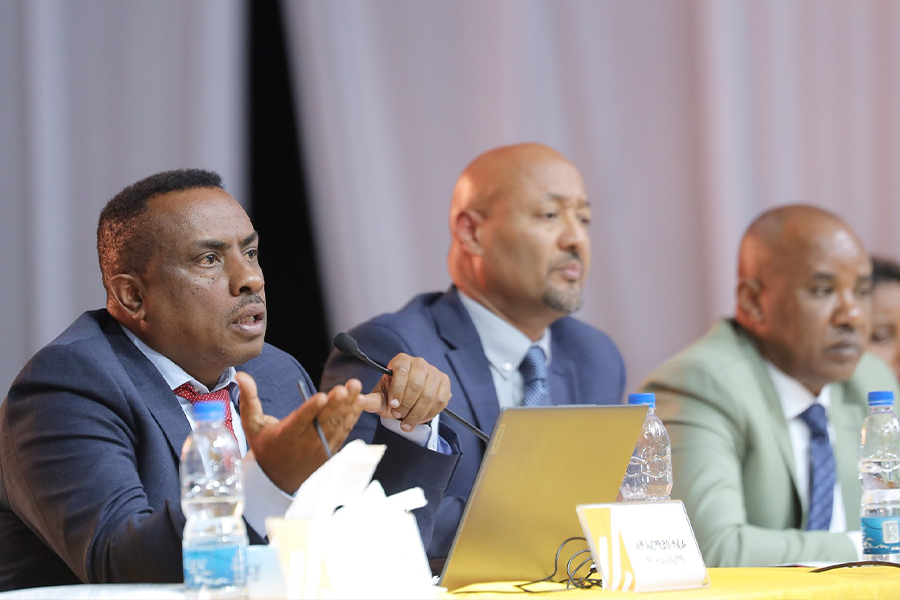
Feb 6 , 2021
By Yehualashet Tamiru
For startups and small and mid-size enterprises (SMEs) and in a country dependent on agriculture, finance plays a crucial role in enabling these businesses to grow and achieve their potential. This is why a proclamation that allows movable property to be used as collateral to access finance could not have come too early, writes Yehualashet Tamiru Tegegn (yehuala5779@gmail.com), adjunct lecturer at Addis Abeba University and an associate at MTA.
Ethiopia is one of the fastest-growing countries in Africa and attracts a large amount of foreign direct investment (FDI). One of the areas investors will look into when deciding whether to invest is the very existence of a comprehensive and modern security law regime.
Under the Civil Code, the two primary security devices are mortgages, which are created for immovable property and businesses as a going concern, and pledges created for movable property. The main form of perfecting a pledge is through the transfer of the possession of the collateral to the creditor.
For startups and small and mid-size enterprises (SMEs), access to finance plays a crucial role in enabling these businesses to grow and achieve their potential. SMEs are built on ideas. Thus, their most valuable asset is the movable property, and they mostly do not own immovable property like buildings. These businesses cannot access finance by using their movable property due to the requirement to transfer the possession of the asset to the creditor, which impedes them from using the asset and generating income.
Further, in a country like Ethiopia where more than half of the population is estimated to be engaged in agricultural production, it is important to create a system that will enable agricultural products to be used as securities to access finance.
To enable businesses and individuals to use their movable property as securities to access finance and create an effective system to govern this, parliament has enacted the Movable Property Security Right proclamation.
It explicitly excludes security rights created for land, houses or buildings from the applicability of the proclamation as these will be governed by the provisions of the Civil Code to a mortgage. Further, the proclamation will not be applicable for securities traded on an exchange, the mortgage of a ship or the interest in an aircraft.
The proclamation applies to security rights created for movable property. The definition of movable property under the proclamation is an illustrative one that includes inventory, agricultural products, incorporeal assets, corporeal assets and the right to use land if it is not prohibited by the law.
The proclamation has introduced several changes to the creation and enforcement of security rights in Ethiopia. One of the changes introduced by the re-characterisation of rights is that if it is created to secure a payment or the performance of an obligation, it will be considered a security right despite the different name given to it by the parties or the type of movable property.
For instance, under Ethiopia’s Civil Code, retention of title has been recognised as a sales transaction. However, it is a security right created over the tangible asset, according to the proclamation. Thus, parties involved in this kind of transaction have to create and perfect their security right according to the requirements of the law to benefit from the priority position and enforcement rights.
The other significant change introduced by the proclamation is allowing security rights over future acquired assets. Thus, the grantor is not required to own the asset when creating the security right. This is a new development from the previous regime, which required the movable good at the time of the creation of the security right.
The other significant change introduced by the proclamation is the perfection of the security right. This refers to the action of creating priority over the collateral and binding third parties. Previously, the main form of perfecting a security interest over movable property was by taking possession of the creditor's collateral. However, the proclamation provides three forms of perfecting a security right over movable properties: registration, possession and control.
Previously, the debtor was required to pay one percent of the collateral value as a stamp duty to register the security right created for it. One of the main changes introduced by the proclamation is abolishing the stamp duty during the registration of the security right. This will make obtaining finance affordable for individuals and SMEs.
Despite these promising introductions, the proclamation has its drawbacks. One of the core principles of contemporary security law is the recognition of party autonomy. This means that contracting parties are free to determine the terms and conditions of the contract. However, the proclamation is too detailed and tries to govern areas that neither violate the country's fundamental policy nor the rights of third parties like that of search criteria and result.
On the contrary, the proclamation seems to keep silent and vague on some areas that have a spillover effect on third parties' rights. For instance, it is indicated that the higher ranking secured creditor may relinquish its right to any competing secured creditor even without the beneficiary being a party to the subordinate. This overlooks that the higher ranking creditor with the malicious purpose of hurting creditors may relinquish his priority right in favour of other secured creditors. Above all, the proclamation fails to provide possible grounds for the elimination of security rights and does not address whether or not a lapsed right of security can be re-established or not.
PUBLISHED ON
Feb 06,2021 [ VOL
21 , NO
1084]

Radar | Feb 23,2019

Fortune News | Jan 14,2023

Life Matters | Jan 15,2022

Agenda | Jun 04,2019

Life Matters | Apr 04,2025

Photo Gallery | 178018 Views | May 06,2019

Photo Gallery | 168227 Views | Apr 26,2019

Photo Gallery | 158976 Views | Oct 06,2021

My Opinion | 137038 Views | Aug 14,2021
Commentaries | Oct 25,2025

Dec 22 , 2024 . By TIZITA SHEWAFERAW
Charged with transforming colossal state-owned enterprises into modern and competitiv...

Aug 18 , 2024 . By AKSAH ITALO
Although predictable Yonas Zerihun's job in the ride-hailing service is not immune to...

Jul 28 , 2024 . By TIZITA SHEWAFERAW
Unhabitual, perhaps too many, Samuel Gebreyohannes, 38, used to occasionally enjoy a couple of beers at breakfast. However, he recently swit...

Jul 13 , 2024 . By AKSAH ITALO
Investors who rely on tractors, trucks, and field vehicles for commuting, transporting commodities, and f...

Oct 25 , 2025
The regulatory machinery is on overdrive. In only two years, no fewer than 35 new pro...

Oct 18 , 2025
The political establishment, notably the ruling party and its top brass, has become p...

Oct 11 , 2025
Ladislas Farago, a roving Associated Press (AP) correspondent, arrived in Ethiopia in...

Oct 4 , 2025
Eyob Tekalegn (PhD) had been in the Governor's chair for only weeks when, on Septembe...

Oct 25 , 2025 . By YITBAREK GETACHEW
Officials of the Addis Abeba's Education Bureau have embarked on an ambitious experim...

Oct 26 , 2025 . By YITBAREK GETACHEW
The federal government is making a landmark shift in its investment incentive regime...

Oct 27 , 2025
The National Bank of Ethiopia (NBE) is preparing to issue a directive that will funda...

Oct 26 , 2025 . By SURAFEL MULUGETA
A community of booksellers shadowing the Ethiopian National Theatre has been jolted b...